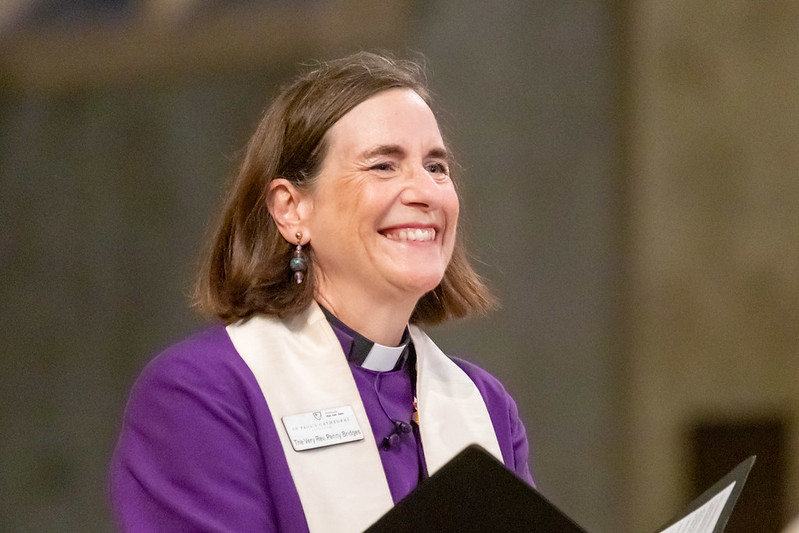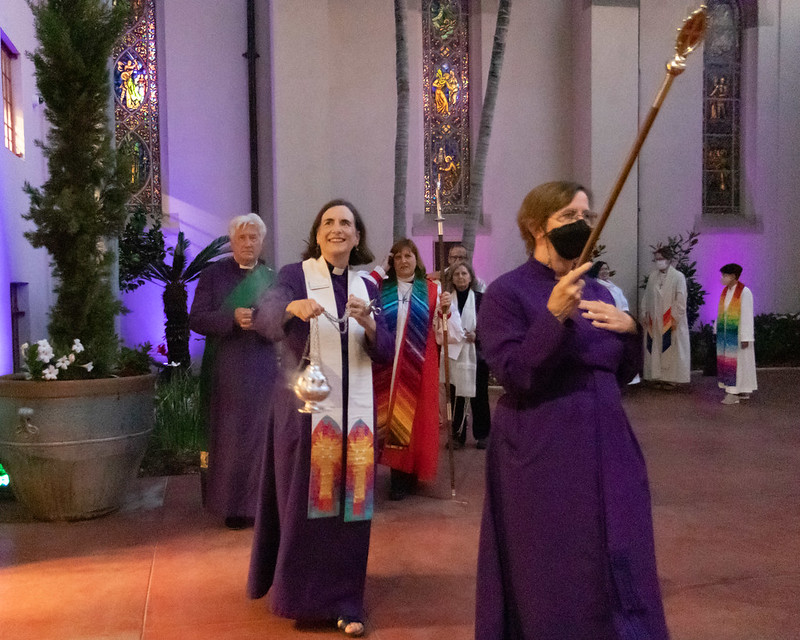Light Up the Cathedral for Pride
July 14, 2021: Resilient
Penelope M Bridges

Good evening, friends. Happy Pride! I am deeply grateful to the Pride leadership for inviting me to give this address tonight. Even though I have spoken in this pulpit many, many times, this is an occasion when Pride gets to select the speaker, and I am conscious of the privilege of being invited to say a few words on behalf of our interfaith community. Our theme this year is “resilient”, and I am looking at a whole lot of shining examples of resilience in this room tonight. Just the fact that so many of you have crossed the cathedral threshold tells me of your resilience, and it gives me hope that there may be a future where all LGBTQ+ people feel as safe in any faith community as you do here. Because, whoever you are and wherever you find yourself in the journey of faith, you are welcome here at St. Paul’s.
Congratulations! You have made it through the pandemic. You have maintained community through lockdown. You have come back together to rejoice, celebrate, and mourn as one. The resumption of this annual observance, as we Light Up the Cathedral for Pride is a gesture of defiance directed at all that would put us down, tear us apart, and injure our souls. We are resilient.
Human beings have an incredible capacity for rising again after hardship. In our sacred writings we read of Noah, building an Ark in the face of his neighbors’ ridicule, enduring the terrible flood, and rebuilding again after the waters subsided. We read of Tamar, who was widowed without children and threatened with destitution, brilliantly seducing her father-in-law, so that he unknowingly fulfilled his own community’s requirement to provide children for her. We read of the followers of Jesus after the crushing loss of his lynching, going out into the world filled with the Spirit and spreading the good news of life and love and liberation to all the nations of the earth. Resilient.
In more recent history we remember the multitudes who left their home countries and made their way to a strange land in search of the freedom to practice their faith as they wished; people who fled Nazi Europe with nothing but the clothes on their backs, people who have walked hundreds of miles through Latin America, and who have created lives for themselves and their families, people whose ancestors were enslaved and abused, but who have risen above that terrible history to become leaders and heroes. Resilient.
Tonight we celebrate those who fight for justice and equity, those who have endured homophobia and bigotry and racism, those who have built the strong, multicultural, rainbow-hued community that is the LGBTQ+ family here in San Diego; and above all, tonight, we celebrate the Two Spirit people, who have survived: the genocide visited on their nations by the European invaders; the religious persecution inflicted by those whose God is much too small; and the legal obstacles that continue to be placed before the original inhabitants of this land; the Two Spirit people who are courageous enough to claim their identity, to live into the fullness of their creation and the exquisite beauty of their culture. Even the term Two Spirit, as a chosen description to replace a derogatory term imposed by European anthropologists, speaks of being resilient.
Nature is resilient: the oyster that takes an irritating grain of sand and makes a pearl. The rose bush that comes back vigorously after being pruned almost to the ground. Let me tell you a brief story about Yellowstone National Park. 70 years after the elimination of wolves upset the balance of nature, the park’s ecosystem was in dire straits; but once the wolves were reintroduced, it took 15 years for the ecosystem to repair itself; and every category of life in the park, both flora and fauna, was healthier than before. We can only hope that this fragile Earth, our island home, will be equally resilient when, God willing, some day, human beings will stop abusing and degrading all that she has to offer us.
In Peter Wohlleben’s book “The Hidden Life of Trees”, he describes how trees communicate among themselves, how they live in a mutual relationship with fungi, how they nurture their young and defend themselves from predators and disease. He writes of how they share water and nutrients, ensuring that those most in need get extra; how they cooperate to photosynthesize in concert. A community of trees is much more resilient than a lonely single tree planted in a garden or on a sidewalk. If even trees need each other in order to build resilience, how much more do we, social creatures that we are? Finding communities of love and trust, building interdependence, sharing abundance, these activities enable us to face the challenges that life throws at us, to be resilient.
As resilient as we are, we do not forget what we have endured: the scars remain. My Christian faith reminds us of this in descriptions of the risen Jesus, who showed his followers the scars left by the nails in his hands and feet. He returned to them alive but for ever marked. And so it is for each of us. We carry the scars of loss, of injustice, of rejection; but here’s the key: we do not let our scars define us. The losses we experience early in life can shape us for good. While we would never have chosen those challenges, we can be grateful that through God’s grace and the wisdom and support of those around us, we can find a way to grow through them, to transform our scars into features that add to our effectiveness as partners, professionals, parents, and even pastors.
Leonard Cohen, who wrote the Anthem that Heather Lawrence will sing in a few minutes, is said to have written this: “There is a crack in everything that you can put together: Physical objects, mental objects, constructions of any kind. But that’s where the light gets in, and that’s where the resurrection is and that’s where the return, that’s where the repentance is. It is with the confrontation, with the brokenness of things.”
The Japanese art form Kintsugi takes broken pottery and repairs it with a golden seam, creating something even more beautiful than the original pot. What a lovely metaphor for being resilient after suffering. We may have been broken, but we can be mended, and by the grace of God the mending will leave us stronger and more beautiful than we were before. I like to think that I have veins of gold running through my brokenness: in this way I can find the courage to make my brokenness visible, to rise again to live fully, to love whole-heartedly, and to let the light that is within me shine out into the world. I hope that each one of you can be equally resilient.
Steven Charleston, who is a retired Episcopal Bishop and a Native American of the Choctaw people, gives us words to live by:
“So live your life that the fear of death can never enter your heart. Trouble no one about their religion; respect others in their view, and demand that they respect yours. Love your life, perfect your life, beautify all things in your life. Seek to make your life long and its purpose in the service of your people.”
― Steven Charleston, The Four Vision Quests of Jesus
Finally, I speak for my colleagues here who serve as leaders in their faith communities. We are here to serve you, to give you hope and courage and unconditional love. We are here to help you heal from the wounds that religious intolerance and prejudice have inflicted on you. We are here for you because you are a beloved child of God, beautiful in your creation and in your woundedness. You are a resilient creature, and with the help of the God who loves you and the community that embraces you, you have it within you to live abundantly and extravagantly. Let your light shine, and claim the Pride that you deserve. Happy Pride, my friends.


